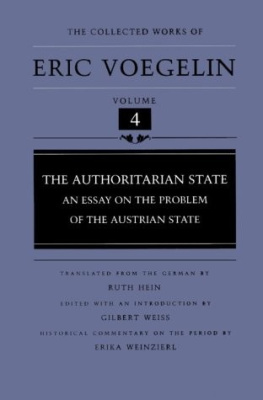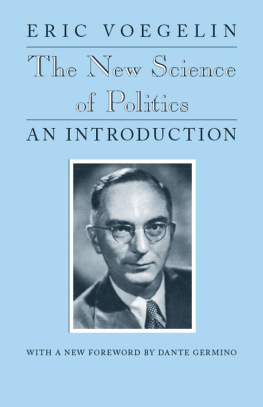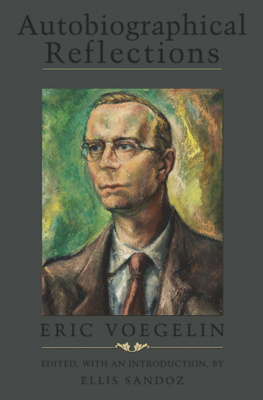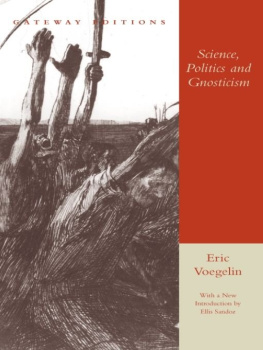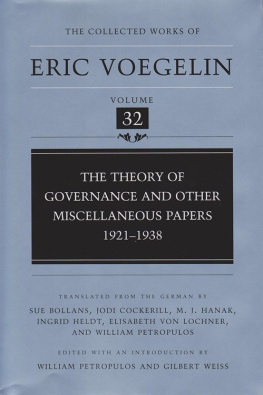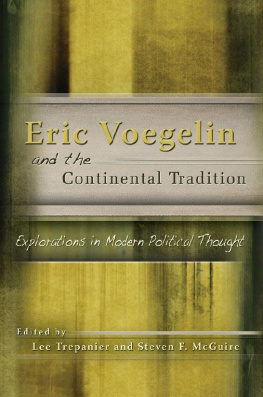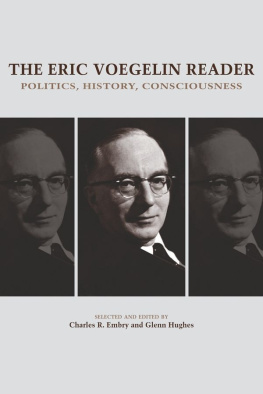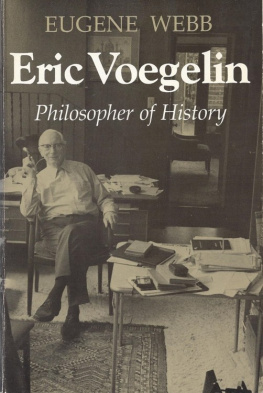The Collected Works
of Eric Voegelin,
Volume 4:
The Authoritarian State:
An Essay on the Problem
of the Austrian State
Ruth Hein, Translator Gilbert Weiss, Editor
University of Missouri Press
ERIC VOEGELIN
VOLUME
THE AUTHORITARIAN STATE
AN ESSAY ON THE PROBLEM
OF THE AUSTRIAN STATE
This page intentionally left blank
PROJECTED VOLUMES IN THE COLLECTED WORKS
- On the Form of the American Mind
- Race and State
- The History of the Race Idea: From Ray to Caras
- The Authoritarian State: An Essay on the Problem of the Austrian State
- Political Religions; The New Science of Politics; and Science, Politics, and Gnosticism
- Anamnesis
- Published Essays, 1922
- Published Essays
- Published Essays
- Published Essays
- Published Essays
- Published Essays, 1966-1985
- Selected Book Reviews
- Order and History, Volume I, Israel and Revelation
- Order and History, Volume II, The World of the Polis
- Order and History, Volume III, Plato and Aristotle
- Order and History, Volume IV, The Ecumenic Age
- Order and History, Volume V, In Search of Order
- History of Political Ideas, Volume I, Hellenism, Rome, and Early Christianity
- History of Political Ideas, Volume II, The Middle Ages to Aquinas
- History of Political Ideas, Volume III, The Later Middle Ages
- History of Political Ideas, Volume IV, Renaissance and Reformation
- History of Political Ideas, Volume V, Religion and the Rise of Modernity
- History of Political Ideas, Volume VI, Revolution and the New Science
- History of Political Ideas, Volume VII, The New Order and Last Orientation
- History of Political Ideas, Volume VIII, Crisis and the Apocalypse of Man
- The Nature of the Law, and Related Legal Writings
- What Is History? And Other Late Unpublished Writings
- Selected Correspondence
- Selected Correspondence
- Hitler and the Germans
- Miscellaneous Papers
- Autobiographical Reflections
- Index
EDITORIAL BOARD
Paul Caringella
Jurgen Gebhardt
Thomas A. Hollweck
Ellis Sandoz
The Editorial Board wishes to give grateful acknowledgment to
those who have contributed to support publication of this book
and series, including the Earhart Foundation, the Foundation for
Faith in Search of Understanding, the Liberty Fund, Robert J.
Cihak, M.D., and John C. Jacobs Jr. A special thanks for support
goes to the Charlotte and Walter Kohler Charitable Trust.
The University of Missouri Press offers its grateful acknowledgment
for a generous contribution from the Eric Voegelin Institute.
THE COLLECTED WORKS OF
ERIC VOEGELIN
VOLUME 4
THE AUTHORITARIAN STATE
AN ESSAY ON THE PROBLEM
OF THE AUSTRIAN STATE
TRANSLATED FROM THE GERMAN BY
RUTH HEIN
EDITED WITH AN INTRODUCTION BY
GILBERT WEISS
HISTORICAL COMMENTARY ON THE PERIOD BY
ERIKA WEINZIERL
UNIVERSITY OF MISSOURI PRESS
COLUMBIA AND LONDON
Originally published in 1936 as
Der autoritare Staat: Ein Versuch Uber das Osterreichische
Staatsproblem by Verlag von Julius Springer in Vienna
Translation and new material copyright 1999 by
The Curators of the University of Missouri
University of Missouri Press, Columbia, Missouri 65201
Printed and bound in the United States of America
All rights reserved 54321 Library of Congress Cataloging-in-Publication Data Voegelin, Eric, 1901- [Autoritare Staat. English] The authoritarian state : an essay on the problem of the Austrian State / translated from the German by Ruth Hein ; edited with an introduction by Gilbert Weiss ; editorial commentary on the period by Erika Weinzierl. p. cm. (The collected works of Eric Voegelin ; v. 4) Includes bibliographical references and index. ISBN 0-8262-1235-2 (alk. paper) 1. AustriaPolitics and government1918-1938. 2. Constitutional historyAustria. 3. AuthoritarianismAustria. I. Hein, Ruth. II. Weiss, Gilbert. III. Weinzerl, Erika, 1925- . IV. Title. V. Series: Voegelin, Eric, 1901- Works. 1989 ; v. 4. B3354.V8813 1989 v. 4 [JN2012] 193 sdc2i [320.9436] 98-24586 CIP @ This paper meets the requirements of the
American National Standard for Permanence of Paper
for Printed Library Materials, Z39.48, 1984. Designer: Albert Crochet
Typesetter: Bookcomp, Inc. Printer and binder: Thomson-Shore, Inc.
Typeface: Trump Mediaeval
Contents
Historical Commentary on the Period by Erika Weinzierl io Part I. Total and Authoritarian as Symbols
i . The Elements of Meaning Contained in the
Symbols Total" and "Authoritarian" Part II. The Austrian Constitutional Problem after 1848
- The Foundation of Austrian Constitutional
Theory: Baron Eotvds Part III. The Authoritarian Constitution since 1933
- Kelsen's Pure Theory of Law and the Problem of
an Austrian Theory of the State
- The Constitutional Transition (March 1933 to
May 1934)
- The Relationship of the Executive to the
Agencies of the Federal and Provincial Legislatures
- Emergency Powers Granted the Administration
and Their Control
- The Directly Democratic and Constitutional
Mechanisms Appendix: The Changes in the Ideas on Goverment and Constitution in Austria since 1918
This page intentionally left blank
THE AUTHORITARIAN STATE
This page intentionally left blank
Editor's Introduction
This edition of The Authoritarian State presents Eric Voegelin's fourth book to an American public for the first time. Two years after its 1936 publication in Vienna by Springer Publishers, when Hitler invaded Austria in March 1938, sale of the book was stopped immediately. During the war the Springer publishing house was bombed, and with its destruction the entire edition of The Authoritarian State was lost. It was not until 1997 that Springer finally reissued this important early work by Voegelin. It is a happy coincidence that this American edition can follow so soon after the first reprinting of the German original.
The Authoritarian State is divided into three parts. Part I provides a critical examination of the symbols authoritarian" and "total" with regard to the most prominent European theories of state and constitutional law of the time. Part II offers a historical analysis of the problems specific to the founding of the Austrian state in 1918-20 and connects these problems to constitutional development in the nineteenth century. Part III presents an investigation into the Austrian situation in the 1930s, the so-called authoritarian constitution of 1934, its theoretical context ( Verfassungslehre ), and the sociopolitical reality underlying these theoretical ideas ( Verfas- sungswirklichkeit ). This third part of Voegelin's book opens with an in-depth discussion and radical criticism of the pure theory of law of Hans Kelsen, Voegelin's early mentor and the "father" of the Austrian Constitution of 1920. Since Erika Weinzierl's introduction to this volume provides detailed information on the historical and political context of The Authoritarian State , I will limit myself here to a few remarks concerning its significance within the larger context of the development of Voegelin's political theory.
In his Autobiographical Reflections (1973), Voegelin characterizes The Authoritarian State as his first serious attempt to understand the role and structure of ideological systems, both left and right. For this attempt, the distinction between theoretical concepts on the one hand and political symbols on the other was of crucial importance. In the first part of The Authoritarian State , Voegelin elaborates that distinction as a conceptual basis for explaining the nontheoretical and speculative character of ideologies. In this context it is shown that total" and "authoritarian" are symbols of ideological self-interpretation, but that they have no theoretical value. This distinction between theoretical concept and political symbol worked out in 1936 becomes essential to Voegelin's later work. In The New Science of Politics (1952), it is reformulated and further elaborated in terms of the Aristotelian episteme and doxa , the "language symbols of political science" and the "symbols used in political reality."1 In his final writings, after having developed a highly differentiated philosophy of consciousness as the basis of his political theory, Voegelin ultimately refines the distinction between theoretical and nontheoretical symbols in terms of "noetic" and "non-noetic" modes of knowledgethen entering a field of experience in which the theoretical concepts are strengthened as symbolizations of transcendental and cosmic experiences (referred to by the Platonic metaxy and the Aristotelian metalepsis ). This experiential philosophy of the "late" Voegelin, of course, goes far beyond the original distinction between scientific concept and doxic symbol. However, Voegelin's approach to political symbols and their ideological constructions as elaborated in The Authoritarian State was not as new for him in 1936 as it might seem after one reads his Autobiographical Reflections . Already in Race and State (1933) he had framed his analysis of the political "race idea" and its adoption in theories of the state with the thesis that "race theories" and "race ideas" have to be sharply distinguished from each other. The conclusion of Race and State was therefore a clear criticism of race (especially in its National Socialist, i.e., racist meaning) as a theoretical concept.
Next page
